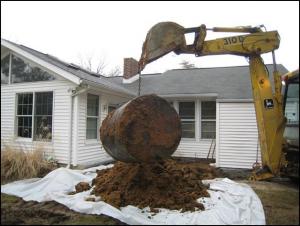DNREC can assist property owners with underground tank removal
Often, when property owners switch from oil heat to gas or electric for home use, their underground storage tanks are left in the ground, many times with fuel oil still inside them. Over time, these tanks rust and begin leaking their contents into the soil. Eventually, a property owner becomes aware of leaking fuel oil, whether by smelling it in their basement or tasting it in their water if they have their own drinking water well.
At that point, the Department of Natural Resources and Environmental Control’s Tank Management Section gets a call for help. Since 2009, DNREC’s Emergency Response Section has responded to hundreds of these leaks, costing tens of thousands of dollars to clean up.
Citing the prevalence of old and disused USTs throughout the state, the Tank Management Section recently initiated a heating fuel Underground Storage Tank Closure Assistance Program to assist property owners with removal or proper closing off of their underground storage tanks if left in place.
The new program is funded by the state’s Hazardous Substance Cleanup Act Fund and administered by DNREC’s Tank Management Section. Gov. Jack Markell has been a major proponent of the program from the outset, having signed into law amendments to the Delaware Underground Storage Tank Act last October authorizing the funding for it. “While often small in size, these forgotten underground storage tanks can cause significant environmental damage to the underlying soil and groundwater,” Markell said. “The program will help eliminate a serious environmental threat to many homeowners and their communities, while also reducing expensive cleanup costs.”
DNREC’s new assistance program covers the cost for the removal or closure in place of eligible heating fuel USTs, and also includes soil sampling and analysis, over-excavation and disposal of up to 22 tons of petroleum-impacted soil. The program also provides site restoration to the extent practicable, subject to statutory limitations and availability of funds.
DNREC Secretary David Small called the Heating Fuel UST Closure Assistance Program “consistent with the DNREC’s mission to be protective of human health, safety and Delaware’s precious environment - by providing limited funding to remove, or close in place, existing unregulated heating fuel USTs, before they have the opportunity to cause a release into the environment.”
Amy Bryson, who administers the UST removal and closure assistance program for the Division of Waste and Hazardous Substances’ Tank Management Section, said the program also is aimed at homeowners’ environmental awareness. “In the past, property owners didn’t think of the potential environmental and safety hazards associated with leaving a UST in the ground,” she said. “Our goal is to help property owners in Delaware remove as many of these problematic tanks from the ground as possible.”
What’s not covered by the new assistance program? Heating fuel USTs greater than 1,100 gallons, replacement costs for new USTs, aboveground storage tanks, or other heating sources like propane or natural gas, or equipment such as heaters or boilers. Also, in some cases, soil contamination may exceed established action levels, and additional investigation and/or cleanup may be required. The program does not cover costs associated with additional investigation and/or cleanup. The program does not cover site restoration activities such as replacement of hardscaping, landscaping, decking and so forth that may have been removed or damaged to perform the UST closure activities. Therefore property owners may be responsible for these additional costs.
For more information and a program application, homeowners and other interested parties should go to www.dnrec.delaware.gov/dwhs/tanks/Pages/Heating-Fuel-UST-Closure-Assistance-Program.aspx. Upon receipt of a completed application, the Tank Management Section will determine if the underground tank in question is eligible for the program. The Tank Management Section will then notify the applicant of the eligibility determination and assign a DNREC-certified UST closure contractor to perform the UST closure and limited site restoration.




















































